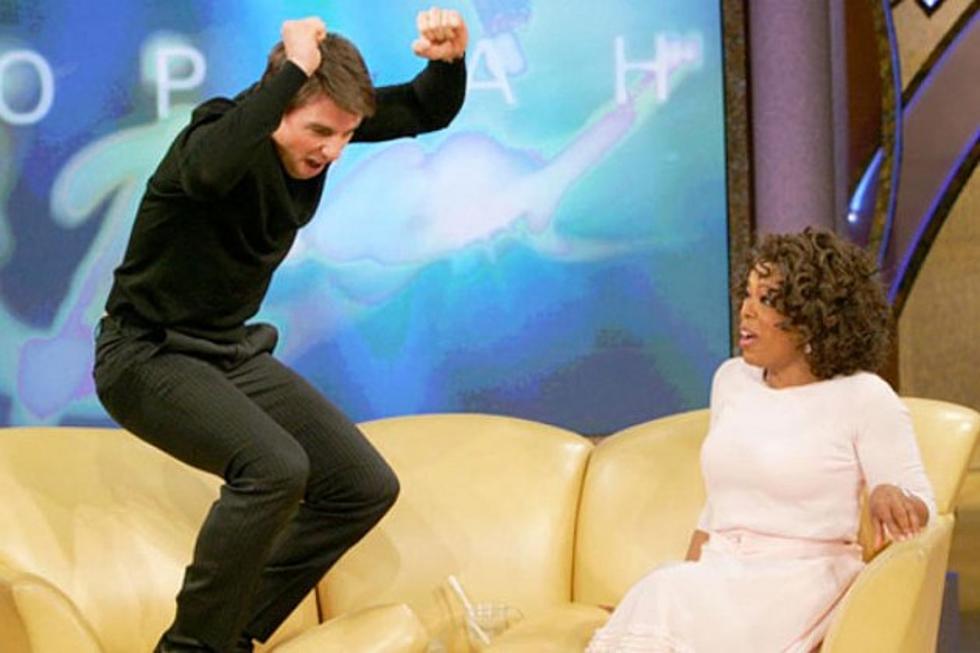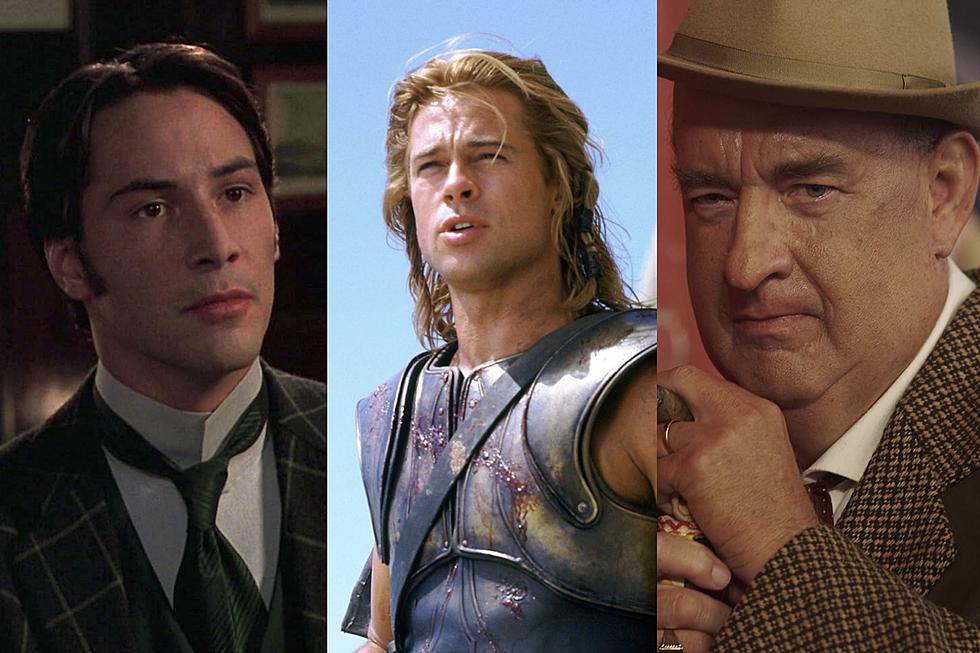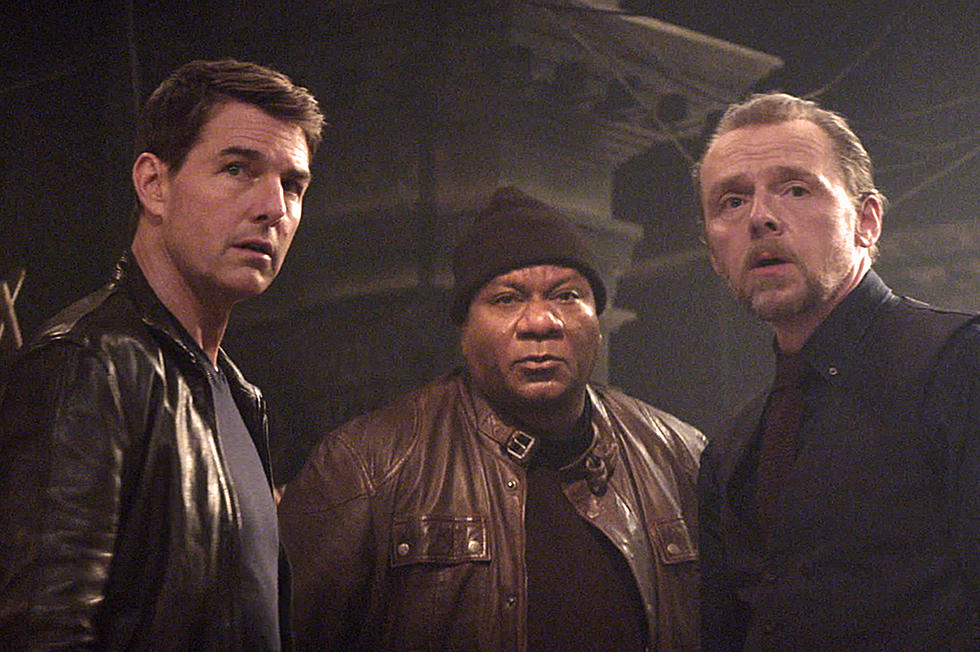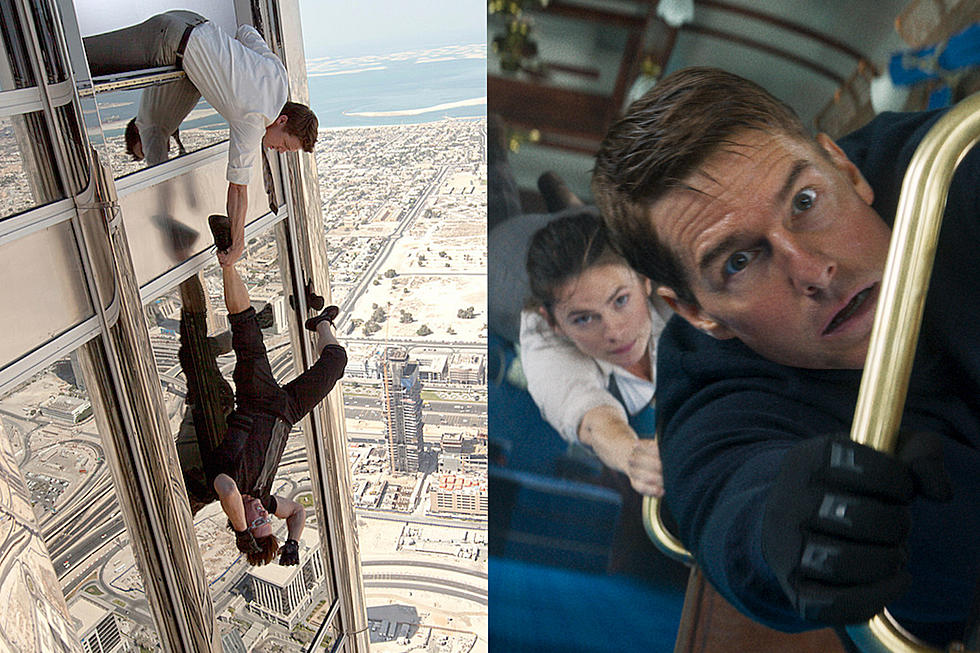
Remembering When Paramount Tried to Fire Tom Cruise From the ‘Mission: Impossible’ Franchise
When the Mission: Impossible Rogue Nation trailer debuted over the weekend everyone got very excited, and rightfully so. Tom Cruise is hanging off the side of an actual plane as it takes off! Audiences weren't the only ones who were excited about Rogue Nation. Paramount was so bullish on the film, they moved it up from a December release date (where it would've faced stiff competition from Star Wars: The Force Awakens) to July. But, the future wasn't always this rosy for Tom Cruise and the Mission: Impossible franchise. It was only 9 years ago this summer that Paramount essentially fired Cruise from his own franchise, terminated his production deal and ushered him off the lot.
We don't think that someone who effectuates creative suicide and costs the company revenue should be on the lot [...] His recent conduct has not been acceptable to Paramount.
This was Sumner Redstone, chairman of Paramount's parent company Viacom, in 2006. This wasn't a quote overheard at a private event or surreptitiously leaked to the media. He wasn't caught off guard by TMZ. This was a public statement issued to the Wall Street Journal announcing the studio's plans to cease their 14-year relationship with Cruise. Redstone was so upset about the disappointing performance of Mission: Impossible III, which grossed almost $100 million less than the previous installment, he blamed Cruise and his controversial behavior leading up to the film's release for costing the studio money.
In the year prior, Cruise had found himself in the headlines for aggressively championing Scientology (famously calling out Brooke Shields on Today for her use of psychotropic medication) and generally getting a little too excited over falling in love with Katie Holmes (famously jumping on Oprah's couch).
“He had never behaved this way before, he really went over the top,” Redstone explained to the Journal. And, he was right. As unusual as it was to hear a media magnate publicly chiding a superstar actor, few questioned the decision. Cruise was alienating his fanbase, especially women, at a rapid rate and his Q rating, a measure of appeal among the public, had dropped over 40%. In 2004, Cruise fired his longtime publicist Pat Kingsley, replacing her with his sister Lee Anne DeVette, a fellow Scientologist with no experience in publicity. A cover story in the August 2005 issue of Vanity Fair read “Has Tom Cruise Lost His Marbles?”
If Tom Cruise was in major need of a career rehabilitation, getting fired might have been an unexpected step in the right direction. Tom Cruise, maybe the biggest movie star in the world, was suddenly an underdog.
In the years following his couch jump, Cruise hired a new publicist (one with actual experience) and stayed away from big-budget action projects. His production company, looking for a new home, signed a deal with MGM, giving him partial ownership in the classic Hollywood studio United Artists. His next two starring roles — Lions For Lambs and Valkyrie — were more dramatic parts in smaller films. Those films were met with mixed results, but it was Cruise's supporting role as the profane studio head Les Grossman in Ben Stiller's Tropic Thunder that may have reminded everyone just how good the actor could be.
The performance was so well received (at Paramount, no less), there was talk of a Les Grossman spinoff movie. Just as quickly as they wanted out, Paramount very quickly wanted back in the Tom Cruise business.
There was still some hesitation within Paramount about Cruise and the Mission: Impossible franchise, but Cruise made it clear he wanted to star in a fourth film. He had an ally in J.J. Abrams, who had made his feature directorial debut on Mission: Impossible III, and was now a rising star at the studio. Abrams had recently directed Star Trek for Paramount and was working on his follow-up film, Super 8, with Steven Spielberg. Paramount greenlit a fourth film with Abrams producing alongside Cruise, but with one small condition: they wanted to groom a new actor to take over the franchise.
Perhaps still wary of Cruise's star power and the flagging box-office receipts of Mission: Impossible III, the studio looked at Ghost Protocol as a soft relaunch of the franchise with an all-new team, and a hot shot new IMF agent that would be groomed as Ethan Hunt's replacement. Enter: Jeremy Renner.
The Oscar-nominated actor was hot off The Hurt Locker and was one of the first people cast by Paramount and Ghost Protocol director Brad Bird. Renner would tell MTV of his future in the Mission: Impossible films, “It's a franchise to potentially take over [...] that's certainly the idea.”
Looking to move the franchise from the crowded summer schedule, Paramount released Ghost Protocol in theaters on December 16, 2011. Despite opening in 500 less theaters than its predecessor, the film far exceeded expectations, grossing just short of $700 million worldwide; the biggest film of the franchise so far and $300 million more than Mission: Impossible III. Audiences and critics loved it. Moreover, audiences and critics loved Tom Cruise.
The showstopper IMAX sequence atop the Burj Khalifa in Dubai was filmed without the use of stunt doubles. The stunt was visually jawdropping and even more impressive when you realize that was actually Tom Cruise hanging off the top of the tallest building in the world. For all the people who laughed in 2005 saying, “Tom Cruise is crazy,” there was now a new chorus of people saying the same thing, but for all the right reasons. Cruise, maybe the only actor crazy-brave enough to do the Burj Khalifa stunt, proved himself to be one of the few Hollywood superstars left in a time when Johnny Depp, Will Smith and Arnold Schwarzenegger have difficulty drawing audiences.
Paramount, who lost the Marvel Studios films after Disney acquired the comic company, desperately needed a hit franchise and Cruise delivered. 2011 was the first time Paramount had been the top studio at the box-office since Mission: Impossible III. The studio, who once publicly severed all ties with Cruise, didn't have to think twice about creating a new franchise with Cruise on Jack Reacher or greenlighting Mission: Impossible Rogue Nation; as the Hollywood saying goes, I don't need you any more, until I need you. It turns out we all still need Tom Cruise.
More From ScreenCrush









